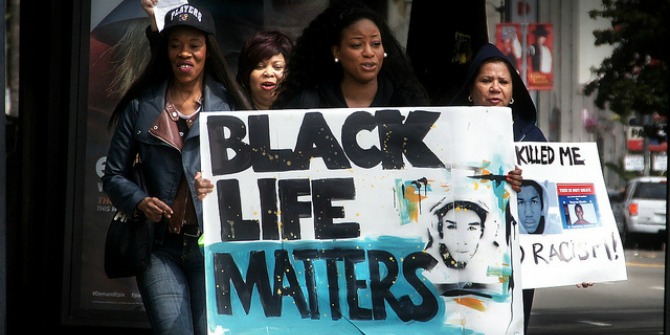Sites of Race is highly recommended reading for anybody with an interest in race in contemporary America, writes Lisa Long. In this timely collection of conversations with Susan Searls Giroux, David Theo Goldberg reflects upon his studies of race and racism, exploring the key elements in his thought and their contribution to current debates.
 Sites of Race. David Theo Goldberg. Polity. 2014.
Sites of Race. David Theo Goldberg. Polity. 2014.
This collection of conversations between South-African-born critical race theorist Professor David Theo Goldberg and Professor of English and Cultural Studies Susan Searls Giroux draws together the key elements of Goldberg’s theorising on race and focuses on three key contributions: Racist Culture (1993), The Racial State (2001), and The Threat of Race: Reflections on Racial Neoliberalism (2007). Reflecting on key concepts such as ‘the racial state’ and ‘racial militarization’, this collection urgently states, with reference to contemporary examples, the need for the ‘persistence’ of antiracism in the face of the postracial, neoliberal agenda.
The first five chapters focus on theory, and the latter five consider contemporary examples such as the shooting of Trayvon Martin and the election of Barrack Obama as the first black US president.
In the opening chapter, “Race to Modernity”, Goldberg reflects on the foundations of his theorizing on race. His formative years in South Africa provide a glimpse into the pervasiveness of race in every aspect of life under apartheid. Goldberg recalls waking each day to a view over Robben Island from his room; a view which forced Goldberg to question, in his words, ‘racially founded privilege and the costs at which it was purchased’. This is the question to which Goldberg returns through his theoretical contributions.
Goldberg then discusses the origins of his first work, Racist Culture. The book began as a dissertation project to trace the origins of the philosophical commitment to race as morally irrelevant. Noting the influence of Foucault, for which his work has been criticised (he responds to critique in Chapter 5, “Fearing Foucault”), Goldberg describes this contribution as ‘a genealogy of modernity’. It is the intellectual underpinnings that had sustained race and racism throughout modernity that Goldberg sought to uncover. He argues that, paradoxically, modernity’s commitment to the pursuit of liberty and equality which insists on racelessness, articulated through colourblindness, protects and privatises discrimination and segregation. This is illustrated through significant contemporary events in the latter half of the book.
Goldberg argues that postraciality has become ‘racism’s contemporary modality of expression’. In Chapter 9, “Racial (Ir)relevance”, he uses the case of Trayvon Martin to illustrate how postraciality operates racially. Martin, a young black man, was shot dead by George Zimmerman, a neighbourhood watch coordinator in a gated community in Florida. Following his trial Zimmerman was exonerated of all charges against him. ‘Reversibility’ operates here to present Martin, the racialised victim, as a legitimate threat. Trading on the ‘sociality of the skin’, conservative commentators relied upon racial characterisations to attribute his death to his ‘thug clothing’ and his attitude. No longer the victim but the ‘victimizer’, this ‘reversibility’ was further legitimised by the exoneration of Zimmerman. Secondly, Zimmerman declared that he had no racist thoughts when he shot Martin. Postraciality operates racially through this declaration of ‘No intentionality’. Martin becomes the agent and Zimmerman the ‘acted upon’. Thirdly, Goldberg posits that the insistence that ‘racism is over’, this extension of postraciality from the erasure of race to the denial of racism, results in racisms without the phenomena of racism with which to identify and challenge its conditions.

In the final chapter, “Reiteracing Obama”, Goldberg argues that Obama embodies postraciality. For race deniers, the twice election of a black president is evidence that America has drawn a line under its racist history. Goldberg analyses the impact of Obama’s failure to address wealth inequalities, joblessness, and two housing bubbles. He argues that the resultant deepening debt of the American population represents a symbolic ‘blackening of America’. Goldberg argues that Obama is neoliberalism with a ‘human face’. The neoliberal agenda reduces all social participation to an individual choice. This allows for racism to be attributed to rogue individuals outside of the concern of the state and therefore, through its invisibility, protected by the state. This, argues Goldberg, is the neoliberal project of the ‘privatisation of racism’; of racisms without race.
Throughout this chapter Goldberg illustrates how Obama’s presidency, instead of confining racisms to history, is a constant reminder that America is ‘deeply racially configured’. Obama has tried to transcend racial politics; however, the office represents the racially ordered and constituted structurally white state. In order to maintain the postracial ‘illusion’ Obama would have to remain completely silent.
Searls prompts Goldberg to an assessment of Obama’s comments on policing following the arrest of Henry Louis Gates, and his subsequent backtracking. Goldberg observes that Obama, having taken a position of being above race, then found himself in the middle of it, feeling uncomfortable he backtracked. This reduced a potentially ‘teachable’ moment about the suspicion and conviction of people of colour in America into a ‘laughable’ one; this left a bitter taste for many of Obama’s African American supporters. This chapter is not an attack on Obama, and Goldberg acknowledges that ‘Obama’s position is impossible’. It is an analysis of the structural constraints faced by America’s first black president, despite the romanticization of his 2008 election.
Goldberg concludes the conversation with a series of questions, the most pressing of which is how we can be non-racial and anti-racist at the same time. Goldberg acknowledges that there is no ‘silver bullet’ and that racism takes many forms. Anti-racism is not a moment but a work of ‘persistence’, a claim made by Angela Davis. The urgent challenge is to work together to expose racisms when their terms of recognition have been ‘buried alive’.
Giroux is clearly in agreement with Goldberg and his analysis is rigorous and well-illustrated. As a result Giroux does not effectively challenge Goldberg; her interjections are a series of prompts to elaborate. One small criticism of the collected conversations is their failure to engage with intersectionality, particularly in relation to gender. Perhaps this is one area where Giroux could have usefully challenged Goldberg.
This is highly recommended reading for anybody with an interest in race in contemporary US. I confess to struggling with some of Goldberg’s ideas previously. This book both unpicks and elaborates upon complex ideas. The conversational style and relation to contemporary examples makes Goldberg’s important and timely contributions infinitely more accessible.
This review originally appeared at the LSE Review of Books.
Please read our comments policy before commenting.
Note: This article gives the views of the authors, and not the position of USApp– American Politics and Policy, nor of the London School of Economics.
Shortened URL for this post: http://bit.ly/1sNqhww
——————————————–
Lisa Long – University of Leeds
Lisa Long is a Doctoral Researcher in the Sociology and Social Policy Department at the University of Leeds. Her PhD is focused on black and mixed ‘race’ experiences of policing. Lisa previously studied BSc Criminology at University of Teesside and has an MA by Research from University of Huddersfield. Additionally, Lisa currently facilitates tutorials on Criminology and Sociology modules. Lisa is on twitter @therealljlong.






